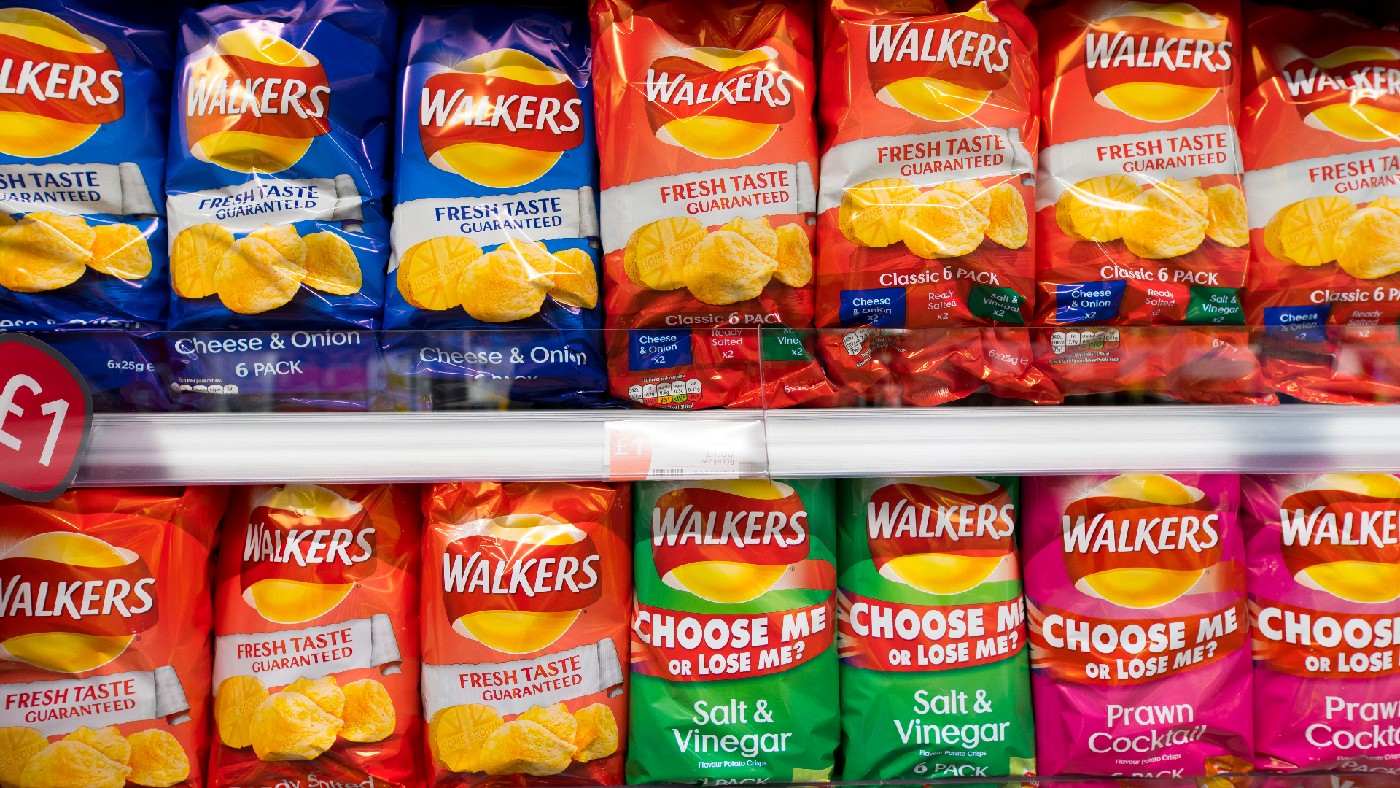Tata Steel strikes £550m deal to solve pensions riddle
Agreement will clear path for company to merge UK assets with ThyssenKrupp of Germany

A free daily email with the biggest news stories of the day – and the best features from TheWeek.com
You are now subscribed
Your newsletter sign-up was successful
Tata Steel calls on staff to consider EU benefits
16 June
Tata Steel has written to its remaining 11,000 UK staff calling on them to consider the benefits of European Union membership ahead of next week's referendum.
The intervention comes as Tata's Indian parent company mulls seven bids for the businesses - and is rumoured to be considering abandoning the sale of its UK assets if it can secure the same concessions the government is offering prospective white knights.
The Week
Escape your echo chamber. Get the facts behind the news, plus analysis from multiple perspectives.

Sign up for The Week's Free Newsletters
From our morning news briefing to a weekly Good News Newsletter, get the best of The Week delivered directly to your inbox.
From our morning news briefing to a weekly Good News Newsletter, get the best of The Week delivered directly to your inbox.
It is widely thought that bosses are waiting for the outcome of next week's vote before making a decision. A final announcement is now not expected until July.
In its letter, reported by the Daily Telegraph, Tata pointedly refuses to back either a Remain or Leave vote.
But head of public affairs Tim Morris warns that "access to the EU market is 'fundamental to our business'", remarks that will be interpreted as supportive of a vote to stay.
"The EU is by far our largest export market, with over a third of our UK steel heading there… access to that market is fundamental to our business," he says.
A free daily email with the biggest news stories of the day – and the best features from TheWeek.com
He also appears to critique the Brexit proposal that the UK could leave the EU but, like Switzerland, be in the single market. This would lead to a critical loss of influence, he says.
"It is likely we would still need to adhere to EU rules to enter that market," he writes. "The difference: we would no longer have a say in how they are set up or applied."
Some in the Leave camp have complained that restrictive EU rules are partly to blame for the crisis facing the UK's steel producers, arguing in particular that state aid rules prevent the government from providing direct financial support.
Labour MP Stephen Kinnock, whose Aberavon constituency includes the Port Talbot steelworks, welcomed the letter.
"Tata’s statement makes it clear that a vote to leave the European Union would be a hammer blow for the British Steel Industry," he said.
Tata Steel bosses 'split' on whether to stay or go
15 June
Tata Steel's Indian parent company has further delayed the sale of its remaining UK assets while it considers whether or not to stay on as owner.
Sources at the firm told the Financial Times that a shortlist of two or three bidders from the seven who submitted a formal approach "may not be finalised until the end of this week or later". An announcement "had been expected several weeks' ago".
Moreover, in a move dubbed "unusual" by one person working on the deal, bosses have gone been back to the potential buyers "several times" in the last month to request further information and clarifications.
Coupled with claims from bidders that "requests for more information from the company in order to substantiate their offers have been frustrated", this is all "slowing the process yet further" and a final decision is not expected until next month.
It is also prompting accusations from some quarters that Tata is "playing everyone for fools", as rumours build that the board is "split" and could scrap the sale and run the business itself.
The government has issued promises on matters such as energy costs and procurement contracts, along with - more lucratively – a pledge to back turnaround plans with a loan of "hundreds of millions of pounds".
More controversial is its plan to hive off Tata's £15bn British Steel pension scheme and link future payments to a lower level of inflation. The required law change this would need is already being discussed.
One source said the sale "lacked a clear timetable and was confusing", while another dubbed the process a "charade… to wheedle further financial concessions out of the UK government".
Delaying the process to July also allows the firm to see the result of the UK referendum on membership of the European Union and to assess what affect this will have on trading. It is likely that a vote to leave would result in at least short-term disruption to European exports.
Losses at Tata's Port Talbot plant and related operations have already been stemmed from £1m a day as steel prices edge higher and a weaker pound boosts exports.
Tata Steel pension cuts will hit older workers hardest but could still prove a good deal
06 June 2016
"Hundreds of members of the Tata [Steel] pension scheme could end up worse off than expected" if cuts following changes to the law are pushed through, says The Times.
Reforms to the Pensions Act 1995 would allow the government to "re-index" increases to payouts from the £15bn British Steel pension scheme to a lower level of inflation, slashing £2.5bn from future liabilities. The scheme's trustees believe this would avoid the need for a Pension Protection Fund bailout.
The pensions fund would also be hived off into a new company, clearing a path for a rescue buyout of Tata Steel's UK assets or for a deal that would see the company stay on in the UK, safeguarding 11,000 jobs in the process.
But the Times says workers who accrued pension savings prior to 1997 might get an even worse deal than annual uprating at the lower CPI measure of inflation. The Financial Times adds that older schemes could be either "frozen, or limited to very small rises".
Even "very small rises" would represent a better deal than the alternative offered by the PPF, though. Pensions export Henry Tapper noted in a blog earlier this year that the PPF's rules state that any accruals made prior to April 1997 are completely frozen.
For other workers, the restructuring would certainly be a far better deal than the ten per cent cuts to all deferred pensions under the PPF. That is why unions are supportive of the controversial plans.
The FT notes, however, that the plans could still be subject to a legal challenge from some of the older pensioners who would lose the most.
Specifically, Tata has admitted that some members, who were transferred into the current fund in 1990 from a previous scheme, raised concerns at the time that the new contract put any future benefits at risk of being cut if they became "unaffordable".
The paper says the "matter was apparently settled in 1995, but it is not clear how".
"The trustee is now investigating the terms on which that dispute was settled," a spokesperson for Tata said, "[and] will be taking further legal advice on this question when the outcome of the government’s consultation is known."
Tata Steel could get £900m government loan to scrap sale
03 June
Ministers are putting "massive pressure" on Tata Steel to scrap a sale of its UK assets, as fears grow that disappointing rescue bids could endanger 11,000 jobs – and many thousands more in the wider industrial sector.
The Times reports that Business Secretary Sajid Javid has even offered to lend the company as much as £900m to refinance an intercompany loan provided by its Indian parent. To avoid breaching European Union rules on state aid, the taxpayer loan would need to be provided on "commercial terms".
As previously reported, the government is also consulting on controversial legal changes that would facilitate a radical restructure of the £15bn British Steel pension schemes currently underwritten by Tata. The funds are £700m in deficit and a millstone around the neck of the business – as well as a major barrier to any sale.
Under the plans, the schemes would be hived off and future payments uprated at a lower level of inflation, cutting liabilities by around £2.5bn.
Focus now has shifted to persuading Tata to stay, as insiders indicate the company is "disappointed" by the size of the rescue bids it has received. It has also failed "to secure assurances that a buyer would commit to keep the [Port Talbot] plant open for more than three years".
Industry sources told Sky News it was no secret that "the government is putting massive pressure on Tata in the effort to get them to stay". Some have previously claimed the company could simply be engaging in a game of "brinkmanship" in order to extract concessions and sweeteners.
Tata has maintained it is focused on finding a buyer for its UK assets, which are losing around £1m a day. The Times reports the company is thought to have narrowed down a field of as many as eight bidders down to three, including a Port Talbot management bid under the name Excalibur, global commodities trader Liberty House and turnaround investor Endless.
An announcement is expected on 24 June, the day after the EU referendum.
British Steel returns as Tata completes Scunthorpe sale
01 June
British Steel is back.
After being privatised by Margaret Thatcher in 1988 and then disappearing following a merger to form Corus Group in 1999, the brand will be the new name of the European Long Products business in Scunthorpe which Tata Steel has finally offloaded.
Tata, which acquired Corus in 2007, announced it was exiting the UK in March, after years of mounting losses. The Long Products unit, based around its huge plant in Scunthorpe, has been sold to turnaround investor Greybull Capital for a nominal £1, while a sale process for the remaining assets, employing more than 11,000 people, is ongoing.
British Steel, as now is, produces steel for the rail and construction sectors. In addition to Scunthorpe, it operates smaller sites across northern England, including Teesside and York, as well as a rail mill in northern France, the BBC notes. It employs a total of 4,800 people.
Commercial director Peter Hogg told BBC Radio Four's Today programme that the company has been trading profitably again for the past two months, thanks mostly to workers agreeing to cuts in their pay and pensions to reduce costs. Wages would return to their previous levels after 12 months, he added.
Pension cuts are a controversial feature of a prospective rescue deal for Tata's remaining UK assets, with plans to hive off the £15bn British Steel schemes into a separate company and change the law to allow future payouts to be uprated at a lower level of inflation.
While Greybull only paid a nominal sum for the part of the business it has acquired, it has put together a £400m finance package to fund a turnaround plan. This was sourced entirely from the private sector, meaning a £100m government loan that had been mooted was not utilised.
The company is perhaps best known for a previous investment in Monarch Airlines, which similarly saw staff agree to pay cuts and was subject to a £125m rescue plan that has successfully returned the firm to profit.
A final decision on a preferred bidder for Tata's remaining operations is to be announced later this month, but reports now suggest the Indian-based company itself might stay on.
-
 Health insurance: Premiums soar as ACA subsidies end
Health insurance: Premiums soar as ACA subsidies endFeature 1.4 million people have dropped coverage
-
 Anthropic: AI triggers the ‘SaaSpocalypse’
Anthropic: AI triggers the ‘SaaSpocalypse’Feature A grim reaper for software services?
-
 NIH director Bhattacharya tapped as acting CDC head
NIH director Bhattacharya tapped as acting CDC headSpeed Read Jay Bhattacharya, a critic of the CDC’s Covid-19 response, will now lead the Centers for Disease Control and Prevention
-
 Can the UK avoid the Trump tariff bombshell?
Can the UK avoid the Trump tariff bombshell?Today's Big Question President says UK is 'way out of line' but it may still escape worst of US trade levies
-
 Five years on, can Labour's reset fix Brexit?
Five years on, can Labour's reset fix Brexit?Today's Big Question Keir Starmer's revised deal could end up a 'messy' compromise that 'fails to satisfy anyone'
-
 Why au pairs might become a thing of the past
Why au pairs might become a thing of the pastUnder The Radar Brexit and wage ruling are threatening the 'mutually beneficial arrangement'
-
 Brexit: where we are four years on
Brexit: where we are four years onThe Explainer Questions around immigration, trade and Northern Ireland remain as 'divisive as ever'
-
 Is it time for Britons to accept they are poorer?
Is it time for Britons to accept they are poorer?Today's Big Question Remark from Bank of England’s Huw Pill condemned as ‘tin-eared’
-
 Is Brexit to blame for the current financial crisis?
Is Brexit to blame for the current financial crisis?Talking Point Some economists say leaving the EU is behind Britain’s worsening finances but others question the data
-
 How Brexit handed a ‘financial boon’ to former Soviet state Estonia
How Brexit handed a ‘financial boon’ to former Soviet state EstoniaIn Depth Around 4,000 companies have set up shop in member state since UK left EU, prime minister says
-
 Why the UK is suffering a Walkers crisps shortage
Why the UK is suffering a Walkers crisps shortagefeature Production issues have forced snack giant to prioritise most popular varieties